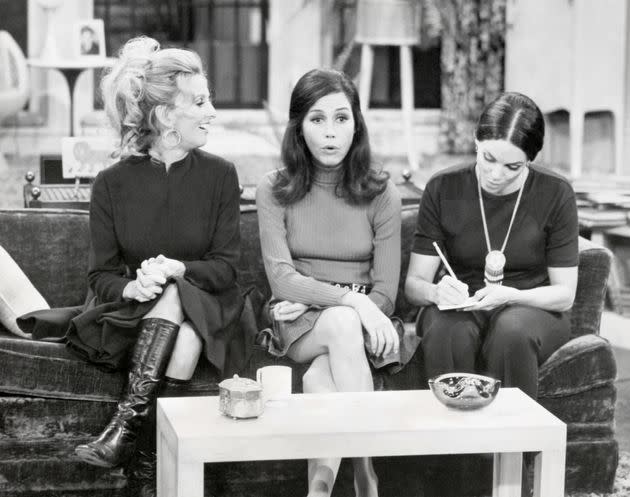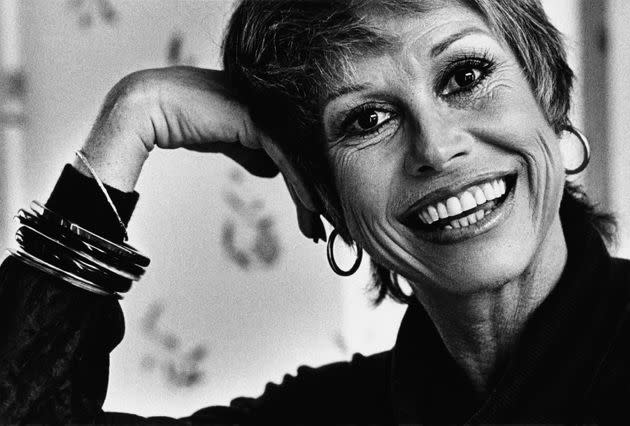What 'The Mary Tyler Moore Show' Taught Me About Growing Up — And Being Single

Picture it, North America, 2017: A new year was upon us. Thousands of women were about to march in Washington after Donald Trump was elected president of the United States. Twitter had never been as on fire, figuratively or literally, as it was the day of his inauguration.
I was in my second year of college, a Canadian who liked to believe he could watch the madman’s circus from a safe distance without it affecting him. But no one was exempt from witnessing this dreaded moment in history.
Then, to top it off, Mary Tyler Moore died.
I don’t remember the very first time I saw “The Mary Tyler Moore Show.” The same way I can’t vividly recall the first rerun I saw of “All in the Family,” “Maude” or “The Jeffersons.” To me, merely watching these shows as background noise was a subconsciously subversive act, one that would make an adult enter the room and say, “You’re watching this?” Looking back, it was a solid precursor to my budding queerness, the burning desire to be set apart from the pack. But then I grew up and learned that attempting to age backward in childhood as a so-called “old soul” had its own mental health repercussions.
In January 2017, I was facing what I’ve heard quite a lot of college students face at one time or another: the crushing realization that I had no real idea of what I wanted to do with my life. I knew I wanted to be a writer of some kind, and that was about it. Many told me I didn’t need to have it figured out beyond that, but they were no match for the voices in my head, mounting in volume as they tried to mentally prepare me for the day when I would be on my own.
I was in a near-constant vulnerable emotional state for my post-secondary years, so I jumped at the chance to enjoy a “Mary Tyler Moore”marathon on the now-defunct Canadian retro channel, Comedy Gold, the weekend following her death. When I watched old episodes of “The Mary Tyler Moore Show” for the first time in years, it felt like the biggest warm hug anyone could ever ask for.

In this episode of "The Mary Tyler Moore Show," Mary Tyler Moore plays Mary Richards, who becomes depressed when a messenger boy calls her "ma'am." As a result, she plans a cheer-up party with her friend Rhoda Gerard, played by Valerie Harper (right). Cloris Leachman's character Phyllis Lindstrom (left) looks on in amusement during the taping of the episode, "Today I Am a Ma'am."
The theme song alone was enough to comfort me away from probing inner anxieties. While the opening credits of “Mary Tyler Moore” would change and evolve over its seven seasons, it never strayed from adequately portraying what the show was about: a single woman, holding down a steady job with friends who care about her but was, at the end of the day, alone. Mary Richards lived alone, shopped alone, slept alone. And she was fine, fulfilled and even happy.
This message was, of course, monumental during the series’ original run between 1970 and 1977 during the rise of second-wave feminism. While some of its office politics might appear dated on the surface, almost everything about “The Mary Tyler Moore Show” holds up in a modern context. It’s the ultimate home and workplace comedy, where Mary can never manage to throw a successful dinner party, but her work colleagues and best-friend neighbors Rhoda (Valerie Harper) and Phyllis (Cloris Leachman) never hold it against her. Mary’s mistakes never define her. They’re presented as just another roadblock on the hideously unpaved highway that is adulthood.
As an only child and a queer person born and raised in suburbia, I’d known what it was like to be alone. I liked it, even. I’d honed my skills as a professional introvert throughout much of my teen years, but that was not enough for well-meaning adults who told me I needed to break out of my shell and open myself up to new experiences — even if I already knew said experiences would not be for me.
I like to say that I raised myself on classic sitcoms of the 20th century because it isn’t an exaggeration. Growing up, I’d always gravitated toward things that other kids didn’t, mostly so it could be something that was “just mine.”
But classic sitcoms went further than that, because I knew that the adults around me had connections to them, too. They grew up when they were on TV, and I liked nothing better than daydreaming what it was like to live in a time that wasn’t my own. The old-soul adage and now cliché of, “You were born in the wrong generation,” has been lobbied at me in my life more times than I can count.
Once I got older, watching “The Mary Tyler Moore Show” allowed me the chance to breathe and rest from constantly trying to solve the riddle of adulthood for myself, as I would soon learn after purchasing all seven seasons on DVD. It showed me that someone can be fundamentally on their own, as I’ve always been, and still live a successful, content life. It showed me that friends can come and go but still become family in the best possible ways. It showed me that a job can just be a job, and not something that you must lose sleep over. Above all, it showed me that regardless of what storm life chooses to send our way, we are all worthy of the chance to make it after all.

Academy Award-nominated film and Emmy Award-winning television actress, Mary Tyler Moore, poses during a 1979 Los Angeles, California, photo portrait session.
But how would I make it on my own? This world is awfully big, as Sonny Curtis reminds us in the original opening theme from the first season, and girl, this time you’re all alone. Sadly, there are only so many life lessons one can infer from a television show about fictional characters who do not exist. There are only so many times one can watch “Mary Tyler Moore” alone in bed on their few days off from an impossibly hectic school/work schedule and think that it will solve the anxiety that would choke me at any given moment.
A television show can change your life; it can heal you in all the ways you need it to ― but it doesn’t replace legitimate treatment for an anxiety disorder.
It can’t, I know that now.
In fact, the last time I rewatched “The Mary Tyler Moore Show” was in the weeks leading up to the breakdown that landed me in a university health clinic. There was once a time when the task of living felt like a burden so heavy I didn’t know how to lighten it. I was prescribed the anti-anxiety medication I should have sought out years ago. In my darkest moments, I’ve still believed that the healing power of a good TV show can solve all my problems.
“Mary Tyler Moore” gave me an excuse to keep living during those times, to not give up simply because the task of becoming myself was too hard and too painful. I now have additional support systems in place to help me when that pain hurts more than it should, but I don’t believe I would’ve developed the courage to reach a place like that if it hadn’t been for Mary Richards and her blueprint for “successful” adulthood.
I don’t worry about being successful anymore. I just focus on taking my nothing days and trying to make them seem worthwhile.

 Yahoo Sports
Yahoo Sports 